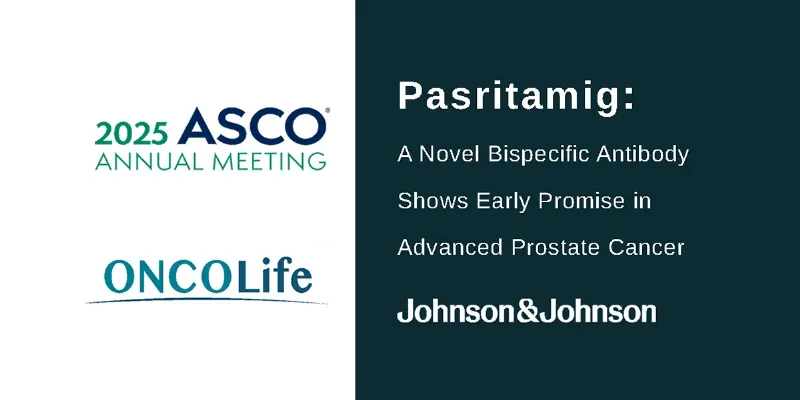Pasritamig’s Favorable Safety and Efficacy in Advanced Prostate Cancer

1 June 2025
The first-in-human results for pasritamig, a bispecific T-cell engager, show promising Phase 1 data in heavily pretreated patients with metastatic castration-resistant prostate cancer (mCRPC). Presented at ASCO 2025, pasritamig demonstrated a ≥50% PSA reduction in 42.4% of patients, a median rPFS of 7.9 months, and a favorable safety profile.
The treatment landscape for metastatic castration-resistant prostate cancer (mCRPC) is poised for potential expansion, following the first-in-human Phase 1 data on pasritamig, a first-in-class bispecific T-cell engager. Johnson & Johnson presented new data at the 2025 ASCO Annual Meeting, and the findings were published in The Journal of Clinical Oncology. These results mark an important step forward for patients who have exhausted existing treatment options.
A Fresh Angle on T-Cell Engagement
Pasritamig’s design represents a novel approach. It binds to CD3 on T-cells and to human kallikrein 2 (KLK2) on prostate cancer cells, harnessing the body’s immune system to selectively target tumors. KLK2 is predominantly expressed in the prostate, offering a highly specific target with minimal off-tumor expression—an attractive feature that may mitigate the risk of broad immune activation and its associated toxicities.
“These first-in-human results for pasritamig are highly encouraging, demonstrating that KLK2 is a viable target for T-cell engagers in mCRPC,” said Dr. Capucine Baldini, Institut Gustave Roussy, and presenting author. “The data show a promising safety profile, with manageable adverse events and no AEs leading to treatment discontinuations or ICANS observed, with 40 percent of patients having no treatment-related AEs at all.”
In this Phase 1 trial (NCT04898634), pasritamig was administered intravenously in a step-up dosing schedule, culminating in 300 mg doses every six weeks. The trial enrolled 174 patients aged 36–89, with a median of four prior systemic therapies, reflecting the refractory nature of this disease setting.
Safety and Tolerability
The results point to a favorable safety profile for pasritamig. In the RP2D safety cohort (n=45), treatment-related adverse events (TRAEs) were predominantly mild. The most common were infusion-related reactions (24.4%), low-grade cytokine release syndrome (CRS) manifesting only as fever (8.9%), and fatigue (15.6%). No higher-grade CRS was observed, and notably, there were no discontinuations or dose reductions due to adverse events. Importantly, no cases of immune effector cell-associated neurotoxicity syndrome (ICANS) were reported.
Grade 3 TRAEs were infrequent, including transient elevations in liver enzymes and neutropenia in less than 5% of patients. The absence of dose-limiting toxicities and the low incidence of serious adverse events support pasritamig’s administration in an outpatient setting, a crucial consideration for patients with advanced disease who often face logistical and quality-of-life challenges.
Early Signals of Efficacy
Encouragingly, pasritamig demonstrated early signs of clinical benefit. In the RP2D efficacy group (n=33), 42.4% of patients achieved a ≥50% decline in prostate-specific antigen (PSA) levels—a marker of treatment response in prostate cancer. Median radiographic progression-free survival (rPFS) reached 7.9 months (95% CI 2.9, not estimable), an encouraging signal in this heavily pretreated population.
These findings align with the need for more effective therapies in mCRPC, where standard treatments offer limited survival benefits. Historical data suggest that overall survival after mCRPC diagnosis typically ranges from 13.5 to 31.6 months, depending on disease burden and treatment history. For patients who have already exhausted multiple lines of therapy, the outlook is particularly bleak, making new targeted strategies like pasritamig essential.
“mCRPC remains one of the most difficult stages of prostate cancer to treat, particularly for patients who haven’t responded well to previous treatments,” said Dr. Jeff Infante, VP of Early Clinical Development and Translational Research at Johnson & Johnson Innovative Medicine.
Looking Ahead
The first-in-human data for pasritamig underscore KLK2 as a promising new target for T-cell engager therapies in prostate cancer. By leveraging this highly prostate-specific antigen, pasritamig appears to balance efficacy with a manageable safety profile, a combination that has eluded many previous T-cell-based approaches.











Comments
No Comments Yet!